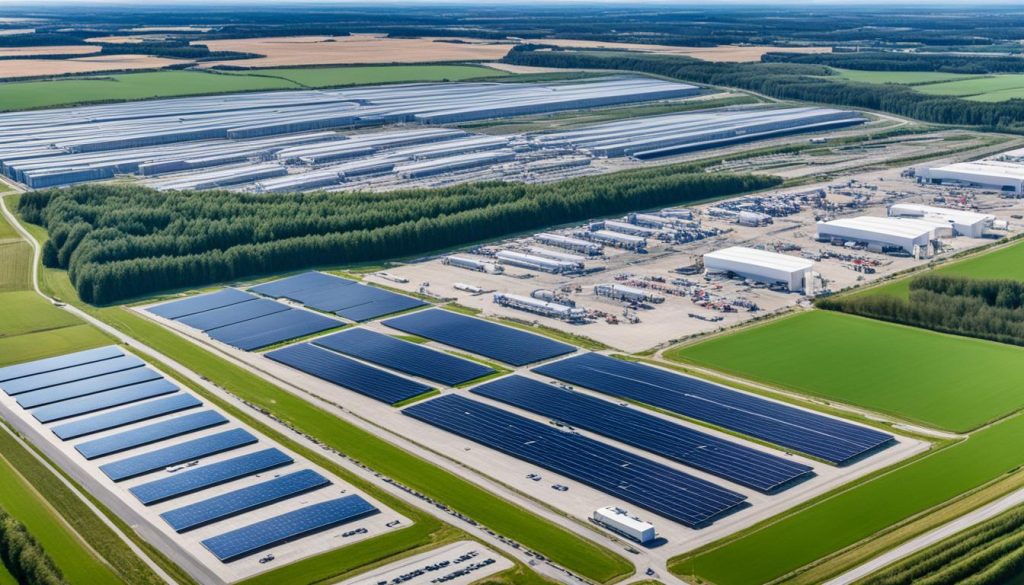Belgium sits at the heart of Europe. Its multilingual workforce and EU stability offer unique advantages to global companies. Grasping Belgium’s business environment is key for firms wishing to grow in this lively market. We explore the complex bond between Belgium and multinational businesses, focusing on local practices, laws, and the economic scene.
Multinational corporations in Belgium face both prospects and hurdles. The country boasts excellent infrastructure, a solid legal system, and a welcoming business atmosphere. Yet, they must adapt to local rules and cultural norms to succeed. This piece gives a detailed look at how global corporations can flourish in Belgium’s intricate market.
Key Takeaways
- Belgium’s central location and multilingual workforce are significant advantages for multinationals.
- Understanding the Belgium business landscape is crucial for successful market entry.
- Multinationals need to comply with Belgium’s regulatory frameworks.
- The Belgium economic climate offers both opportunities and challenges for foreign investment.
- Effective navigation of local business practices is crucial for multinational success.
Understanding the Belgian Market
To understand the Belgian market well, it’s important to examine various aspects. These include the market size, demographics, key industries, and the economic state. Belgium is a key spot for global companies due to its prime location and business-friendly scene. Grasping these elements lets companies master the Belgian market’s challenges.
Market Size and Demographics
Belgium’s people are diverse and speak many languages, such as Dutch, French, and German. The country’s population is over 11 million, with a high living standard and a median age of 41.8 years. This population mainly lives in cities, valuing convenience and easy access to goods. The Belgian market analysis shows that people have strong buying power. This is due to a good social security system and high income levels.
Key Industries in Belgium
Belgium’s success comes from key sectors like pharmaceuticals, chemicals, and automotive. It houses big pharmaceutical companies like Pfizer and Johnson & Johnson. The automotive industry includes production plants by Ford and Volvo. There’s also a booming tech sector in cities like Brussels and Ghent. These sectors are essential for the country’s growth and economy stability.
Economic Situation
The economic health of Belgium is shown by its Belgium GDP, around $529 billion recently. GDP growth is slowly increasing each year. The unemployment rate is about 5.6%, lower than many nearby countries. Still, it’s an area needing attention. Belgium is known for its strong financial system and legal business protections. These factors make Belgium an appealing place for business activities.
- Population: 11 million
- Median Age: 41.8 years
- Key Industries: Pharmaceuticals, Chemicals, Automotive, IT
- Belgium GDP: $529 billion
- Unemployment Rate: 5.6%
With key insights on Belgian market size, demographics, industries, and economic state, companies can plan their Belgian ventures wisely. Understanding these points helps businesses thrive in Belgium.
What is Belgium vs multinational business?
It’s vital to understand the difference between local Belgian companies and big international ones. We’ll dive into how they compare, focusing on the competition and looking at the perks and challenges for multinationals.
Comparison Criteria
When we compare the business scene, several areas show differences between local businesses and multinationals:
- Market Access: Local Belgian businesses know the market well and have good contacts. Multinationals, though, may need time to build these up.
- Scalability: Big international companies have a lot of resources, so they can grow quickly. This is harder for smaller local businesses.
- Legal Framework: The local laws can be tricky. Multinationals have to deal with more complicated laws than local businesses do.
Market Challenges and Opportunities
Entering the Belgian market is tough for multinationals. They face language issues, cultural differences, and complicated government rules. But Belgium is a key entry point to the bigger European market, which brings many opportunities:
- Language Barriers: Companies from outside need to handle Belgium’s three main languages: Dutch, French, and German.
- Complex Governance: It’s tough to deal with the different rules in Belgium’s regions like Flanders, Wallonia, and Brussels.
Even with its challenges, Belgium’s great location and solid infrastructure create big opportunities. Multinationals can reach the European market well from here.
Belgium’s Regulatory Environment

In Belgium, businesses work within a clear set of rules. These laws and regulations aim to keep things fair and in order. We’ll look into important aspects such as work laws, taxes, and trade rules.
Labour Laws
In Belgium, laws protect workers’ rights, leading to a fair work environment. Workers should not work more than 38 hours a week. These laws cover paid holidays, minimum pay, and the right to join unions. It’s crucial for companies in Belgium to follow these rules to look after their staff and avoid fines.
Taxation Policies
Belgium’s taxes are key for businesses. The country offers good tax rates for companies, especially for foreign investments and research and development. There are also tax benefits for spending on new ideas and intellectual property. It’s vital for big and international firms to understand these tax rules to manage their money well and stay within the law.
Trade Regulations
Being in the European Union affects Belgium’s trade laws greatly. Companies in Belgium get to enjoy the benefits of EU trade laws, making it easier to do business across EU countries. Belgium follows both its own and EU’s trade rules, creating a smooth trading space.
| Regulation Aspect | Details |
|---|---|
| Labour Laws | Standard 38-hour work week, minimum wage policies, unionisation rights |
| Taxation Policies | Competitive corporate tax rates, incentives for foreign investments, favourable R&D tax treatment |
| Trade Regulations | Compliance with EU trade laws, facilitation of cross-border trade within EU |
Opportunities for Multinational Businesses in Belgium
Belgium is a great place for multinational businesses to grow. It offers important business benefits, making it a top choice for investments.
Key Investment Sectors
There are key sectors in Belgium ready for investment. Green technology is booming, thanks to Belgium’s focus on sustainable growth. The life sciences area is also promising, with many biotech and pharmaceutical companies thriving from strong research support.
The logistics and transportation sector benefits from Belgium’s great infrastructure and location. Being in the heart of Europe lets Belgium serve as a central spot for getting goods across the continent.
Strategic Advantages
Companies in Belgium enjoy many strategic benefits. A highly skilled, multilingual workforce is a big advantage. Belgium’s top-notch infrastructure makes business operations smooth.
The country’s central place in Europe makes reaching big markets easy. This, along with great investment opportunities in key sectors, makes Belgium a leading choice for businesses.
Challenges Faced by Multinational Businesses in Belgium
Belgium offers a distinct set of multinational business challenges. To succeed, businesses must tackle regulatory and cultural complexities. We will look into these key issues faced by multinational companies.
Regulatory Compliance
Compliance challenges are huge for companies in Belgium. The nation’s complex governance and strict EU laws complicate things. Firms must deal with local and EU laws, causing more work and legal risks.
Cultural Differences
Understanding multinational business challenges in Belgium also means dealing with cultural integration. Belgian business norms and social customs can be quite different. Knowing the language and regional differences is key. The Flemish and French regions have their own ways, so cultural awareness is essential for smooth operations and cultural integration.
| Challenge | Impact | Solution |
|---|---|---|
| Regulatory Compliance | Increased administrative tasks, potential legal issues | Engage local legal experts, develop robust compliance strategies |
| Cultural Differences | Miscommunications, inefficient practices | Implement cultural training programmes, adapt business approaches |
Case Studies of Multinationals in Belgium

Belgium is a great place for multinational companies to grow. Its strategic spot, many languages spoken, and strong infrastructure help international businesses succeed. This section looks at some multinationals that have done well in Belgium and what we can learn from them.
Success Stories
Unilever is a shining example of success. This consumer goods giant has made the most of Belgium’s benefits. By opening their European headquarters in Brussels, Unilever made delivering goods across Europe easier. They also worked with local suppliers and matched local tastes to win over many customers.
IBM is another success story. It has made strong connections in Belgium through its focus on innovation and technology. By hiring talented locals and partnering with Belgian universities, IBM has led the way in innovation. This shows the value of working closely with local academia and research groups.
Lessons Learned
However, not every multinational has had an easy time. Some stumbled because they didn’t research the market well. For example, a global retail chain didn’t do as well as hoped because they missed what Belgian shoppers like. This tells us how crucial it is to understand local customers and fit their culture.
A tech firm also found it hard to handle Belgium’s complex laws. The firms that do best in Belgium are those that follow local regulations closely. It’s vital for companies to work with the authorities from the start.
In sum, these business stories teach us the value of partnership, knowing the local scene, and involving local skills and laws. These are key to succeeding as a multinational in Belgium.
Market Entry Strategies for Multinationals
For businesses going global, getting into Belgium needs the right strategy. There are many ways to enter this market successfully. We’ll look at the best strategies and what to think about:
Starting a joint venture is a top choice for many. Partnering with Belgian companies brings many benefits. This includes shared resources and better market understanding.
This partnership means quicker entry into Belgium, thanks to the local partner’s knowledge and network.
Mergers and acquisitions are also effective. Buying a Belgian company means quick entry. It combines international skills with the local company’s customers and setup.
This way, multinationals get a strong market position fast in Belgium.
Using exports is another way to enter without being physically there. Sending products to Belgian sellers or buyers lets businesses test the market. This helps in planning big investments better.
Franchising is a safer way to get market share. It lets businesses grow quickly using their brand but involves local entrepreneurs. This keeps the brand’s quality while growing in Belgium.
| Strategy | Key Considerations |
|---|---|
| Joint Ventures | Shared resources, local expertise, faster market acclimatisation |
| Mergers and Acquisitions | Immediate market access, existing infrastructure, customer base |
| Direct Exports | Market testing, minimal upfront investment, flexible adaptation strategies |
| Franchising | Rapid scaling, brand control, lower operational risk |
Impact of Belgium’s Economic Policies on Multinationals
Belgium’s policies have a big effect on big international firms. Fiscal policies and international agreements guide how businesses invest and operate there.
Fiscal Policies
Belgium uses various fiscal strategies to draw in multinationals. These include tax breaks and incentives for investment, spurring on economic growth. The country boosts innovation and research, giving multinationals an advantage.
Trade Agreements
Being part of the EU, Belgium enjoys wide market access. This helps it work internationally and boosts operations of multinational firms. Trade agreements lower barriers and make it easier for goods and services to move. This greatly benefits Belgium’s role in the global business scene.
Let’s look at how Belgium’s policies and agreements affect multinationals working there:
| Key Factor | Impact | Details |
|---|---|---|
| Fiscal Policies | Positive |
|
| Trade Agreements | Positive |
|
This approach makes Belgium an attractive place for global firms, thereby boosting its economic influence worldwide.
Technology and Innovation in Belgium

Belgium is growing fast in technology, thanks to strong research and innovation. The government helps by giving R&D incentives. This makes Belgium a great place for tech advances and attracts foreign money. Let’s look at how Belgium is becoming a key player in technology and its effect on global businesses.
R&D Initiatives
The Belgian government offers R&D incentives to boost business innovation. There are tax breaks, grants, and financial help for research-focused companies. This support makes it less risky for businesses to try new tech ideas. Belgium also has tech parks and hubs that show its commitment to growing the technology sector.
Belgian universities and businesses work together too. Their joint efforts lead to top-notch research. This partnership turns academic studies into real-world tech solutions, speeding up technological progress.
Impact on Multinational Businesses
Belgium’s strong R&D support attracts big international tech companies. Giants like Microsoft and Siemens have set up major R&D centers in Belgium. This gives them an edge, helping them stay ahead in the fast-moving tech world.
Also, Belgium’s location in Europe is a big plus for global companies. It makes it easy to spread new tech across the continent. Belgium’s role in tech and innovation draws in multinational firms, showing its importance on the world stage.
Belgium’s Workforce and Talent Pool
Belgium boasts a workforce known for its high skill levels and strong educational backgrounds. Companies eyeing the Belgian market find its labour pool attractive. This is due to a great mix of technical abilities and softer skills. A sophisticated education system ensures the workforce remains top-notch.
Skills and Education
The education system in Belgium is split into three parts: Flemish, French, and German-speaking communities. Each community is focused on creating a skilled workforce through diverse educational paths. Top universities like Katholieke Universiteit Leuven and Université catholique de Louvain play a key role.
Besides, Belgium emphasises lifelong learning and professional growth. This keeps its workforce globally competitive. Such commitment to education means companies can easily find the talents they need.
Availability of Talent
Belgium sees a constant flow of graduates ready to jump into various sectors. This is great for multinational companies in a tight competition for the best talent. A balanced ratio of skilled professionals to job openings makes hiring smoother for companies.
The country also uses incentives to keep and draw in top talents. A clear and effective employment framework makes hiring straightforward. This addresses talent needs efficiently.
To wrap it up, Belgium’s strong labour market, supported by an excellent education system, offers many opportunities for businesses. With a focus on ongoing education and professional development, Belgium stands out as an appealing place for multinational companies. They find a competitive edge in this environment.
Belgium’s Infrastructure and Logistics
Belgium is known across Europe for its high-quality infrastructure. Its offers unbeatable logistics and transport for businesses. This is because of its spot as a key logistics centre in Europe.
In the heart of Belgium’s success are its roads, ports, airports, and railways. Its roads link big cities and industrial areas well. This supports transport needs inside the country and internationally.
Moreover, Belgium is home to busy ports like the Port of Antwerp. These ports are crucial for transporting goods into and out of Europe. They play a big role in allowing quick import and export.
Belgium’s airports, with Brussels Airport leading, are vital for moving goods and people. They offer a wide range of cargo services. This strengthens Belgium’s role as a main logistics centre in Europe.
The country also has a great railway network. High-speed trains connect it to nearby countries. They boost freight transport efficiency throughout Europe. This mix of transport means businesses have many logistic solutions.
In summary, Belgium’s top infrastructure and strategic place make it a key logistics hub in Europe. It helps businesses have smoother supply chains. This makes Belgium an attractive spot for global companies looking to improve their logistics in Europe.
Legal Considerations for Multinationals Operating in Belgium
For multinational companies, understanding Belgium’s legal system is crucial. This includes knowing about corporate governance. It makes sure companies act ethically and are accountable. Belgian laws demand high standards of governance to avoid legal issues.
Another key area is intellectual property rights. These rights protect inventions, brands, and technological advances. Belgium’s strong IP laws help keep business assets safe. Multinationals need to follow these laws to protect their innovation
Lastly, solving disputes is important in Belgium. The Belgian legal system can seem complex, especially when dealing with contract, employment, or business conflicts. It’s vital to do careful checks and get legal advice. This approach helps multinationals follow Belgian law, reduce risks, and protect their investments.
















